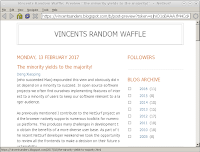Niels Thykier: Improving bulk performance in debhelper
Since debhelper/10.3, there has been a number of performance related changes. The vast majority primarily improves bulk performance or only have visible effects at larger input sizes.
Most visible cases are:
Filed under: Debhelper, Debian
- dh + dh_* now scales a lot better for large number of binary packages. Even more so with parallel builds.
- Most dh_* tools are now a lot faster when creating many directories or installing files.
- dh_prep and dh_clean now bulk removals.
- dh_install can now bulk some installations. For a concrete corner-case, libssl-doc went from approximately 11 seconds to less than a second. This optimization is implicitly disabled with exclude (among other).
- dh_installman now scales a lot better with many manpages. Even more so with parallel builds.
- dh_installman has restored its performance under fakeroot (regression since 10.2.2)
- avoiding fork+exec of commands for things doable natively in perl. Especially, when each fork+exec only process one file or dir.
- bulking as many files/dirs into the call as possible, where fork+exec is still used.
- caching / memorizing slow calls (e.g. in parts of pkgfile inside Dh_Lib)
- adding an internal API for dh to do bulk check for pkgfiles. This is useful for dh when checking if it should optimize out a helper.
- and, of course, doing things in parallel where trivially possible.
- If you use install_ file,prog,lib,dir , then it will come out of the box. These functions are available in Debian/stable. On a related note, if you use doit to call install (or mkdir ), then please consider migrating to these functions instead.
- If you need to reset owner+mode (chown 0:0 FILE + chmod MODE FILE), consider using reset_perm_and_owner. This is also available in Debian/stable.
- CAVEAT: It is not recursive and YMMV if you do not need the chown call (due to fakeroot).
- If you have a lot of items to be processed by a external tool, consider using xargs(). Since 10.5.1, it is now possible to insert the items anywhere in the command rather than just in the end.
- If you need to remove files, consider using the new rm_files function. It removes files and silently ignores if a file does not exist. It is also available since 10.5.1.
- If you need to create symlinks, please consider using make_symlink (available in Debian/stable) or make_symlink_raw_target (since 10.5.1). The former creates policy compliant symlinks (e.g. fixup absolute symlinks that should have been relative). The latter is closer to a ln -s call.
- If you need to rename a file, please consider using rename_path (since 10.5). It behaves mostly like mv -f but requires dest to be a (non-existing) file.
- Have a look at whether on_pkgs_in_parallel() / on_items_in_parallel() would be suitable for enabling parallelization in your tool.
- The emphasis for these functions is on making parallelization easy to add with minimal code changes. It pre-distributes the items which can lead to unbalanced workloads, where some processes are idle while a few keeps working.
- Helmut Grohne
- Kurt Roeckx
- Gianfranco Costamagna
- Iain Lane
- Sven Joachim
- Adrian Bunk
- Michael Stapelberg
Filed under: Debhelper, Debian

 Took me a hell of a long time to get my head out of my arse and dive again
into some Debian related work. Thanks to Nik for pushing me from time
to time.
So I've taken the time to upload LyX 2.2.2 to unstable and it's now
build with Qt5. Afterall the package is still missing a lot of love,
but I hope we've once again something for the upcoming stable release,
that is close to the latest upstream stable release. If you use LyX please
give it a try.
For myself it's now the 6th year that I stopped using LyX after maintaining
it for five years. And still I'm sponsoring the uploads and try to keep it
at least functional. Strange how we sometimes take care of stuff even if we
no longer have an active use for them.
Took me a hell of a long time to get my head out of my arse and dive again
into some Debian related work. Thanks to Nik for pushing me from time
to time.
So I've taken the time to upload LyX 2.2.2 to unstable and it's now
build with Qt5. Afterall the package is still missing a lot of love,
but I hope we've once again something for the upcoming stable release,
that is close to the latest upstream stable release. If you use LyX please
give it a try.
For myself it's now the 6th year that I stopped using LyX after maintaining
it for five years. And still I'm sponsoring the uploads and try to keep it
at least functional. Strange how we sometimes take care of stuff even if we
no longer have an active use for them.